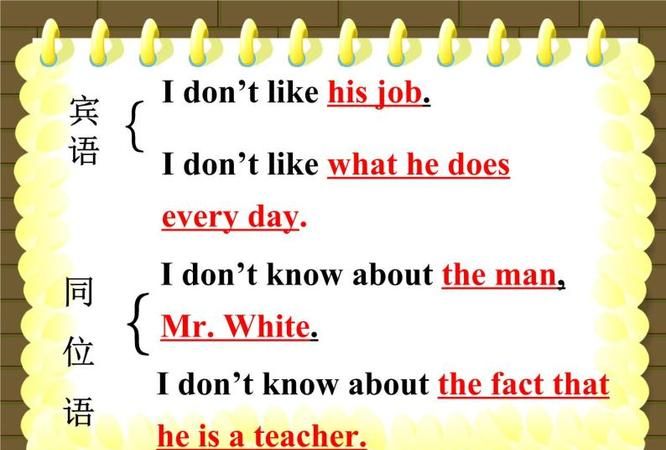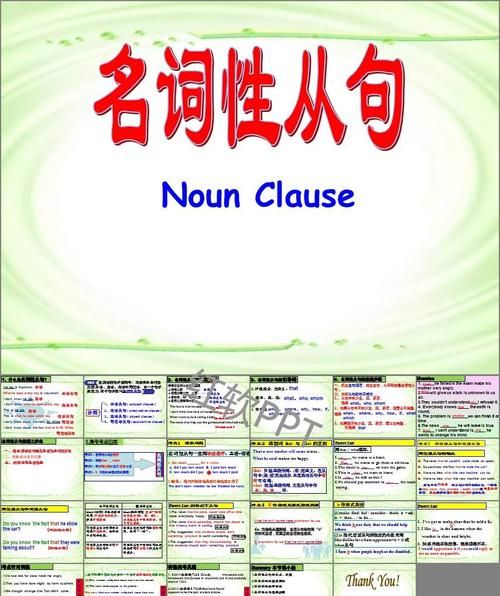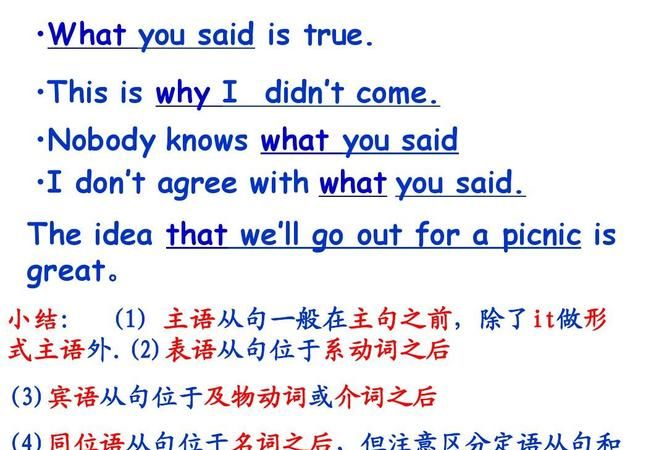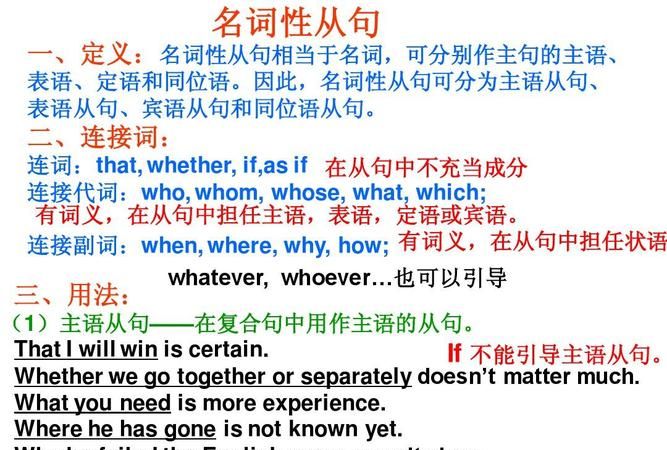本文目录
高二英语选修二第一单元课件
高二英语是整个高中英语的中间部分,学好高二英语对于高中英语来说至关重要,下面是我整理的课件。
高二英语第一单元课件
一、教法建议 。
本单元通过对迪斯尼乐园及沃尔特迪斯尼本人成功之路的简介,使学生了解美国文化特色的同时树立起正确的成功观,培养百折不挠的意志品质;学习并熟练掌握问路、引路等日常交际用语;总结归纳宾语从句,并通过创设情境,使学生能够灵活运用。 在教学中建议使用整体教学、分层次训练的方式。英语教学应面向全体学生,并根据学生的不同英语水平分层次进行能力训练。每个层次的训练内容相同但难易程度不同,从而达到因材施教的目的。 建议教师授课前在黑板上挂一幅世界地图,并帮助学生在地图上找出法国、日本的东京、美国的洛杉矶和佛罗里达;同时设置相关问题:“你们能说出这几个城市、国家之间的共同点吗?”让学生稍作思考后告之;在他们那里都有迪斯尼乐园。同时,最好附以有关迪斯尼乐园的图片、幻灯及录像。通过这种较为直观的方式,激发起学生的学习兴趣,提高学习效率。 本单元能力目标: 1.对话(Lesson 1) a.朗读:语音语调准确,情感适度; b.归纳:归纳出用英语问路、指路的方法。 Asking Directions:
★Excuse me。Can you tell me the way to…?
How can I get to…?
Where is…?
Where is the nearest…?
Which is the way to…?
Giving Directions:
★Go straight ahead till you see…
down this street till you get to…
through the gate and you will find the entrance to…
★It's about…yards/metres down this street。
c.运用:套用句型模拟对话;
d.创造:自编对话并表演;
e.写作:复述并将对话改写成短文。
2.课文(Lesson2、3)
b.归纳大意,能复述课文。
Lesson 2 Walt Disney
Para。 1 Walt Disney's greatest wish。
Para。 2 Encouragement from his friends。
Para。 3 Walt Disney and his mouse friend。
Para。 4 The Birth of the cartoon character,Mickey Mouse。
Para。 5 Disney's successes。
Lesson 3 Disneyland
1953: the first Disney Park was opened Rules: wear clean shoes and trousers
1971: Disney World was opened in Florida not allowed to have beards
1983: Tokyo Disney was opened tie back the long hair
1992: Euro-Disney was opened always smile and be friendly
The Sleeping Beauty Castle: The Tomorrow Land Building:
A favourite place for visitors Go inside the space
c.将课文改写成100词左右的短文;
d。改编成剧本并参加演出。
本单元重点知识:
a.单词:ahead, entrance, free, sign, encourage, well-known, unsuccessful, studio, operate, imagine, though。
b.词组:take along (wish sb。), in the hope of, of interest, lose heart, day after day, as far as…, bring sth。 on, in this way。
以上单词和词组可通过对话录音,教师介绍Walt Disney和Disneyland过程当中呈现,然后用问答讨论课文内容等方式,再现以上单词和词组,加深理解词义,掌握用法,最后用句型转换或补全句子等方式巩固、开发运用。
例1 What will you do if your friend fails in the exam?
I will __________ him (or her) not to__________ ____________ 。(encourage; lose heart)
例2 On May Day, parks are ___________ to visitors。 (free)
例3 When Disney was young, he wanted to be a famous artist。
When Disney was young, he _________ _________ __________ _________ __________becoming a famous artist。 (was, in, the, hope, of)
例4 They didn't show any interest in Disney's pictures, so they said, "Sorry, we don't think there is _________ __________ __________ ___________ __________ _________。"(anything, of, interest, in, your, pictures)
以下句子供教学参考:
1.The road ahead was blocked by a big fallen tree。
2.Ahead of us is the Sleeping Beauty Castle。
3.The new building was finished three months ahead of time。
4.Haven't you seen the sign saying "No Smoking"?
5.Are dark clouds a sign of rain?
6.I explained what I couldn't explain in words by signs。
7.He signed his name at the bottom of the letter。
8.The policeman signed (for) them to stop。
9.The teacher encouraged the children to study on their own。
10.They are encouraged to speak out their opinions。
11.Several weeks passed, she hadn't received any encouraging news。
12.All the Disney parks are operated by the same company。
13.It's not difficult to operate that machine。
14.The doctor decided to operate on him at once。
15.The operation of a new machine can be hard to learn。
16.Let's meet at the entrance to the cinema。
17.He takes along a notebook wherever he goes。
18.He went there in the hope of meeting some of his old friends。
19.Day after day they did the same thing in the factory。
20.The number of the college students is increasing year by year。
21.He walked as far as the village where I lived。
22.As/So far as I know, he is still working there。
23.The waiter soon brought on the meal。
24.More study should bring on your English。
二、学海导航
These photographs will show you ________ 。
A.what does our village look like
B.what our village looks like
C.how does our village look like
D.how our village look like
正确答案是B项。
该题考查的是名词性从句的连接词及其语序,该题是名词性从句作宾语。名词性从句要用陈述句语序,连接词的选择要根据从句的动词及其意思。
根据上述原则,A和C的语序不对,再是根据look like来判定用what还是how,like是介词,跟名词或代词作宾语,所以应选B。
Dr。 Black comes from either Oxford or Cambridge, but I can?/FONT>t remember 。
A.where B.there C.which D.that
正确答案是C项。
此题考查的是对either…or…的理解和对代词which的使用。题干说布莱克大夫不是来自牛津大学就是剑桥大学,我记不清楚(哪一所大学)。remember是及物动词,其后只能用名词或代词作其宾语,此语境缺的是表示有疑问意味的代词。虽然D项中that是代词,但它不具备疑问意味,因此必须排除掉。
— to the Capital Theatre?
—The No。 3 bus over there will take you right there。
A.I'm sorry, which is the way
B.Excuse me, could you tell me how I can get
C.Excuse me, which bus shall I take
D.I'm sorry, could you tell me how I can get
正确答案是B项。
在已经做了对不起对方的事时,用I?/FONT>m sorry表示道歉;在还未做某事你又认为这事会给对方造成一些麻烦时,用Excuse me。英语中到达某处是get to a place。如果用bus作主语,那么正确的问句是Which bus can take me to the Capital Theatre?因此应选择B项。
The Value of Time
We have many things to do。 When we are students, we learn and study。 When grown up, we work for society, for our nation, and for the world。 We are born to be busy。 But we cannot live more than one hundred years; we have only a limited time to do much work。 How precious our time is!
Many men do not realize the value of time。 This is, indeed, a great pity。 "Time is money" is an old saying。 In fact, it is more valuable than money。 Wasting time means wasting a part of our precious life。
We have to form the habit of saving time, instead of spending time uselessly。 It is necessary for us to do our work today, let us do it today, and not leave it till tomorrow。 Laziness is the thief of time。 It not only brings us failure, but does harm to us as well。 Remember that if a man in youth does not do his best, he will feel very sorry when he is old。
—Who is Jerry Cooper?
— ? I saw you shaking hands with him at the meeting?
A。 Don't you meet him yet?
B。 Hadn't you met him yet?
C。 Didn't you meet him yet?
D。 Haven't you met him yet?
正确答案:D项。
本题对学生使出了一个“障眼法”,即答语的第二句话为一般过去时。这很容易使人误以为空格处的时态应为“过去的过去”──过去完成时。而空格处的那句话意为:难道你没有见到他吗?强调的是一个截止到现在、发生过的动作,因此只能是现在完成时。
三、智能显示
重点句型
Go through the gate and you'll find the entrance to Bear Country on the other side。
祈使句+and主谓句,这种句子含义相当于if引导的条件句+结果句。上述句子可改为:
If you go through the gate, you'll find the entrance to Bear Country on the other side。
Use your head and you'll find a way。
如果动动脑子,你就会想出办法来。
Keep on trying, and you'll succeed。
如果你不断努力,你就会成功。
补全对话
Inspector:You want to get to King's Cross Station?
Peter: Yes。
Inspector:It's easy。 There is a bus every ten minutes from Stop Number Two。 The next bus is at nine, and a ticket to King's Cross Station costs fifteen pence。 1 It's all in here, you see。 This is my first day in my job, but it's all in here。
Peter: Good。
Amy: 2 We want to get to Cross Station by car。
Inspector:By car?
Peter: 3 。
Inspector:Oh。 Well, drive along that road。 4 Straight on。
Peter: 5 。
Amy: Yes, thanks。 And gook luck in your new job, inspector。
Inspector:Thank you, madam。 Goodbye!
A.Yes, sorry。
B.Thank you。
C.Is it so far away?
D.But we are in our car, you see。
E.I'm afraid I can't tell you。
F.It takes ten minutes to get there。
G.It's about three kilometers to King's Cross Station。
单词拼写
6.When I saw her, she was standing the e to the cinema, waiting for me。
7.Whenever I lose heart in the study of English, she world always e me and help me with it。
8.Can you i living on the moon?
9.We hope your experiment will be a great s 。
10.Look! There runs a big m and a cat is running after it。
单项选择
11.Helping the disabled people__________ him a lot of time after work。
A。 spent B。 paid C。 got D。 cost
12.You can take the lift, which is_________ by electricity。
A。 worked B。 lifted C。 ridden D。 make
13.Carl_________ San Francisco and is now working at Disneyland。
A。 is leaving B。 left C。 has left D。 will leave
14.I remember ____________this used to be a quiet village。
A。 when B。 how C。 where D。 what
15.I can hardly imagine Peter __________across the Atlantic Ocean in five days。
A。 to sail B。 sailing C。 sail D。 to have sailed
16.I learned to_________ a bicycle as a small boy。
A。 drive B。 ride C。 operate D。 run
17.“Do you remember_________ he came?”
“Yes, I do, he came by car。”
A。 how B。 when C。 that D。 if
18.You can't imagine __________ when they received these nice Christmas presents。
A。 how they were excited B。 how excited they were
C。 how excited were they D。 they were how excited
19.The secretary worked late into the night, ____________ a long speech for the president。
A。 to prepare B。 preparing C。 prepared D。 was preparing
20.The computer centre, _______________ last year, is very popular among the students in this school。
A。 open B。 opening C。 having opened D。 opened
21.Our headmaster is strict ___________himself and____________ his work。
A。 with, in B。 with, to C。 in, for D。 against, for
22._________ __________ you will improve your spoken English。
A。 Try your best, and B。 Trying your best, or
C。 Try to your best, but D。 Keep your best, or
23.I don't believe_________ is true。
A。 that he said B。 what did he say
C。 what he said D。 all did he say
24.Standing on the top of mountain, you'll get a wonderful__________ 。
A。 visit B。 sign C。 view D。 nature
25.He looked everywhere__________ the key to his room。
A。 at the hope to find B。 on the hope of finding
C。 in the hope to find D。 in the hope of finding
完型填空
In school all over the world boys and girls are learning foreign languages。26 knows his own language, but another one is very useful, 27 when we travel to other countries。 If we go to France, we 28 be able to speak French, and in Germany people will 29 us to understand German。
How many languages are there in the world? There are about fifteen hundred , but many of them are not very 30 。 English is one of the most important 31 so many people use it, not only in English and the USA, 32 in other parts of the world。 About 200,000,000 people speak it 33 their own language , and another 200,000,000 use it as 34 language。 It is difficult to say how many people are learning it。 Many millions of schoolboys and schoolgirls are trying to do so。
English children study French, 35 is also a very important language。 An Englishman can 36 find someone in almost all parts of the world who is able to talk to him in either English or 37 。
Which is the best way to learn a language ? We should remember that we all learnt our own language well when we were children。 If we could learn a second language 38 same way, it would not seem so 39 。Think of what a child 40 。 It listens to what people say , and it tries to imitate (模仿) what it hears。 When it wants something, it 41 ask for it。 It is 42 the language, talking in it, and thinking in it all the time。 If people had to use a second language all the time , they would learn it quickly。
43 is important to remember ,also ,that we learn our own language by hearing people speak it, not by seeing 44 they write。 We imitate what we hear。 In school 45 you learn to read and write as well as to hear and speak, it is 46 to learn all new words through the ear。 You can read them, spell them, and write them later。
A man who stuttered (说话结巴) once went to a shop where they sold birds。 He wanted to buy a parrot (鹦鹉),a bird which we can teach to 47 。 He said to shopkeeper:“Have you g-g-got a p-p-parrot that can t-t-talk English?”
“Yes sir。”Answered the shopkeeper。“ 48 a fine green one what will understand everything you say to it。”
So the man bought it 。 But a few days 49 he took it back to the shop。
“This b-b-bird can't t-t-talk,”he complained (抱怨)。 “It can only st-t-tutter。” 50 a parrot learns to say just what it hears。
26。A。No one B。 Someone C。 Everybody D。 Any one
27。A。generally B。 strictly C。 specially D。 especially
28。A。can B。 ought to C。 may D。 have to
29。A。hope B。 insist C。 expect D。 help
30。A。necessary B。 easy C。 important D。 difficult
31。A。because B。 although C。 when D。 if
32。A。and B。 or C。 but D。 nor
33。A。as B。 like C。 for D。 with
34。A。another B。 the second C。 the other D。 a second
35。A。that B。 which C。 it D。 this
36。A。hardly B。 sometimes C。 easily D。 freely
37。A。German B。 Russian C。 Japanese D。 French
38。A。by a B。 by the C。 in a D。 in the
39。A。disappointing B。 exciting C。 difficult D。 useless
40。A。does B。 speaks C。 learns D。 likes
41。A。ought to B。 is able to C。 has to D。 decides
42。A。learning B。 using C。 studying D。 trying
43。A。That B。 This C。 It D。 What
44。A。what B。 how C。 why D。 as
45。A。because B。 although C。 as soon as D。 among
46。A。necessary B。 best C。 better D。 possible
47。A。sing B。 write C。 speak D。 talk
48。A。It's B。 Here's C。 That's D。 This's
49。A。later B。 ago C。 before D。 after
50。A。So B。 Also C。 Even D。 Such
阅读理解
O。 Henry was a pen name used by an American writer of short stories 。His real name was William Sydney Porter 。 He was born in North Carolina in 1862。As young boy he lived an exciting life 。 He did not go to school for very long , but he managed to teach himself everything he needed to know。
When he was about 20 years old , O。 Henry went to Texas , where he tried different jobs 。 He first worked on a newspaper ,and then had a job in a bank 。 When some money went missing from the bank , O。 Henry was believed to have stolen it 。 Because of that , he was sent to prison 。During the three years in prison , he learned to write short stories 。After he got out of prison , he went to New York and continued writing 。He wrote mostly about New York and the life of the poor there 。 People liked his stories ,because simple as the tales were , they would finish with a sudden change at the end ,to the readers' surprise。
51。In which order did O。 Henry do the following things?
a。 Lived in New York。 b。 Worked in a bank。
c。 Travelled to Texas。 d。 Was put in prison。
e。 Had a newspaper job。 f。 Learned to write stories。
A。e,d,f,b,d,a B。c,e,b,d,f,a
C。e,b,d,c,a,f D。c,b,e,d,a,f
52。People enjoyed reading O。 Henry's stories because __________
A。 they had surprise endings
B。 they were easy to understand
C。 they showed his love for the poor
D。 the were about New York City
53。O。Henry went to prison because ____________
A。 people thought he had stolen money from the newspaper
B。 he broke the law by not using his own name
C。 he wanted to write stories about prisoners
D。 people thought he had taken money that was not his
54。What do we know about O。 Henry before he began writing?
A。 He was well-educated。
B。 He was not serious about his work。
C。 He was devoted to the poor。
D。 He was very good at learning。
55。Where did O。 Henry get most material for his short stories?
A。 His life inside the prison。
B。 The newspaper articles he wrote。
C。 The city and people of New York。
D。 His exciting life as a boy。
Suppose you were the famous cartoon maker—Walt Disney, and now a newspaper reporter is interviewing you。 Here are the questions and please answer them as creatively as possible。
1。What were you most interested in when you were young?
2。Did you think you would be a famous artist as a young man?
3。What are the secrets to the success?
4。What's your plan for the future?
Answers:
1—5 GDAFB 6。entrance 7。encourage 8。imagine 9。success 10。mouse
11—15 DACAB 16—20 BABBD 21—25 AACCD 26—30 CDBCC 31—35 ACADB
36—40 CDDCA 41—45 CBCAB 46—50 BCBAC 51—55 BADDC

高中英语语法名词性从句课件
名词性从句是由if, whether, that 和各种疑问词充当连接词所引导的从句,其功同名词一样.
一.主语从句
主语从句是在复合句中充当主语的从句,通常放在主句谓语动词之前或由形式主语it代替,而本身放在句子末尾.
1. It 作形式主语和it引导强调句的比较
It 作形式主语代替主语从句,主要是为了平衡句子结构,主语从句的连接词没有变化.而it引导的强调句则是对句子某一部分进行强调,无论强调的是什么成分,都可用连词that.被强调部分指人是也可用who/whom.
2. 用it 作形式主语的结构
(1) It is +名词+从句
(2) it is +形容词+从句
(3) it is +不及物动词+从句
(4) it +过去分词+从句
3. 主语从句不可位于句首的五种情况
(1) if 引导的主语从句不可居于复合句句首.
(2) It is said , (reported) …结构中的主语从句不可提前.
(3) It happens…, It occurs… 结构中的主语从句不可提前.
(4) It doesn’t matter how/whether …结构中的主语从句不可提前.
(5) 含主语从句的复合句是疑问句时,主语从句不可提前.
4. What 与that 在引导主语从句时的区别
What 引导主语从句时在句时在从句中充当句子成分,如主语.宾语.表语,而that 则不然.
定语从句也称为关系从句或形容词性从句,由关系代词(who, whom, whose, which, that)或关系副词(as, when, where, why)等引导.关系词除了起引导作用外,还在从句中指代前面的先行词,并在从句中担任一定的成分.
一、限定性定语从句和非限定性定语从句
定语从句就其与先行词的关系而言,可分为限定性定语从句和非限定性定语从句.限定性定语从句和先行词之间没有逗号,表示对先行词起修饰限制作用;而非限定性定语从句和先行词之间有逗号分开,是对先行词进行补充说明,相当于并列句.如:
He is the man who has strong personality. 他是个个性很强的人.(限定性定语从句)
My brother, who works abroad, is coming next week. 我哥哥在国外工作,他下周将回来.(非限定性定语从句)
注:1. 非限定性定语从句不能用that来引导,一般用which,as或who(指人).用which或as引导时,既可以修饰主句的部分内容,也可修饰主句的全部内容.如:
He spoke confidently, which impressed me most. (which指代整个主句,在从句中作主语)
2. as引导的非限定性定语从句既可以放在主句之前,也可以放在主句之后,但which或who引导的非限定性定语从句不能放在主句之前.如:
As we all know, the moon is a satellite of the earth.
The large area is covered with thick snow, which affects people's life greatly.
3. 在限定性定语从句中,关系代词作宾语时可以省略;但在非限定性定语从句中,关系代词作宾语时不能省略.如:
The film (which) I saw last night is about a young teacher. (which可以省去)
She introduced me to her husband, whom I hadn’t met before. (whom不能省去)
二、通常只用关系代词that,不用 which,who或whom的几种情况
1. 当先行词是all, everything, nothing, something, anything, little, much, none, few等时.如:
All that you want are here.
2. 当先行词被all, no, some, any, every, a few, a little, much, only, very等修饰时.如:
There is no person that doesn’t make mistakes.
3. 当先行词被序数词或形容词最高级修饰时.如:
This is the best film that I have ever seen.
4. 当出现两个或两个以上的先行词,并同时兼指人和物时.如:
We are talking about the people and countries that we have visited.
5. 当主句是以which 或 who 开头的特殊疑问句时.如:
Who is the person that is standing over there?
6. 当定语从句为there be 句型时,关系代词只能用that,但经常可以省略.如:
I know the difference (that) there is between you.
7. 当关系代词在从句中作表语时,常用that.如:
He does not seem to be the man that he was. 他似乎和过去不一样了.
三、as 与其他词连用引导的定语从句
as 引导定语从句时,可指人也可指物,通常与the same,such,so等连用,形式为:the same… as,such… as,as …as,so… as.As在定语从句中可作主语、宾语、表语等.如:
She knew he felt just the same as she did. 她知道他的感觉与她自己的一样.(as代替事,作宾语)
I lend you such books as will interest you. 我借给你使你感兴趣的书.(as代替物,作主语)
注:the same… as 和the same… that的用法不同.as引导的定语从句表示其内容与主句所讲的事物“相似”,指同类事物;that引导的定语从句表示其内容与主句所讲的事物是“同一个”,指同一事物.如:
This is the same pen as I lost yesterday. 这和我昨天丢的笔一样.(类似的笔)
This is the same pen that I lost yesterday. 这支笔就是我昨天丢的那支.(同一支笔)
四、“介词+关系代词”引导的定语从句
在“介词+which/whom”结构中,介词的选择取决于三种情况:
1.定语从句中谓语动词或表语的搭配.如:
This is the college in which I am studying.
He is the man about whom we are talking.
2.先行词与介词的习惯搭配.如:
The speed at which the machine operates is shown on the meter. 仪表上显示出这台机器运转的速度.
3.当定语从句为最高级时只能用of which; 否则用其他介词.如:
I have five dictionaries of which Longman Dictionary is the best.
I have five dictionaries among which Longman Dictionary is published in UK.
注:不可拆分的动词短语介词不能提前,如put up with;有的短语可能有不同的介词搭配,此时需要根据上下文来确定.如:be familiar with/to,compare with/to等.
有时为表意清楚,还可以在关系副词where/ when前加介词from, to等.如:
China is the birthplace of kites, from where kite flying spread to Japan, Korea, Thailand and India. 中国是风筝的故乡,从这里,放风筝的运动传到了日本、韩国、泰国和印度.

高中英语从句语法归纳总结
高中英语主要要掌握三大从句。
分别是:
1、定语从句(形容词从句)
2、名词词从句(包括主语从句,宾语从句,表语从句,同位语从句)
3、状语从句(副词性从句,包括时间,地点,结果,目的,原因等)
一、定语从句:
定语从句(Attributive
Clauses)在句中做定语,修饰一个名词或代词,被修饰的名词,词组或代词即先行词。定语从句通常出现在先行词之后,由关系词(关系代词或关系副词)引出。
1、关系代词引导的定语从句
关系代词所代替的先行词是人或物的名词或代词,并在从句中充当主语、宾语、定语等成分。关系代词在定语从句中作主词保持一致。
(1),
who,
whom,
that
这些词代替指人,“whom”作宾语指人,“that”既可作主语又可作宾语(作宾语可以省略),可以指人也可以指物。
(2),Which
用来指人或物
(用作主语、宾语,作宾语时可以省略)
(3),whose
“whose”表示谁(可以为人也可以为物)的(东西)
2、关系代词引导的定语从句
(1),关系副词why主要用于修饰表示原因的名词(主要是the
reason),同时它在定语从句中用作原因状语。
(2),关系副词when主要用于修饰表示时间的名词,同时它在定语从句中用作时间状语。
(3),关系副词where主要用于修饰表示地点的名词,同时它在定语从句中用作地点状语。
3、非限制性定语从句
它起补充说明作用,缺少也不会影响全句的理解。在非限制性定语从句的前面往往有逗号隔开。
二、名词性从句
在句子中起名词作用的句子叫名词性从句
(Noun
Clauses)。
名词性从句的功能相当于名词词组,
它在复合句中能担任主语、宾语、表语、同位语、介词宾语等,因此根据它在句中不同的语法功能,名词性从句又可分别称为主语从句、宾语从句、表语从句和同位语从句。
引导名词性从句的连接词可分为三类:
1、连词(5个):that
(宾语从句或表语从句中that有时可以省略)
whether,if
(均表示“是否”表明从句内容的不确定性)
as
if
,as
though
(均表示“好像”,“似乎”)
以上在从句中均不充当任何成分
2、连接代词(9个):what,
whatever,
who,
whoever,
whom,
whomever,
whose,
which,
whichever
3、连接副词(7个):when,
where,
how,
why,
whenever,
wherever,
however
三、状语从句
状语从句
(Adverbial
Clause)
状语从句指句子用作状语时,起副词作用的句子。它可以修饰谓语、非谓语动词、定语、状语或整个句子。根据其作用可分为时间、地点、原因、条件、目的、结果、让步、方式和比较等从句。状语从句一般由连词(从属连词)引导,也可以由词组引起。从句位于句首或句中时通常用逗号与主句隔开,位于句尾时可以不用逗号隔开。
状语从句细分的话,共包括九种:
1.时间状语从句
2.地点状语从句
3.原因状语从句
4.条件状语从句
5.目的状语从句
6.让步状语从句
7.比较状语从句
8.方式状语从句
9.结果状语从句

高中英语人教版定语从句是第几单元的
一、定语从句 引导定语从句的关系代词有that, which, who(宾格whom),所有格whose)和关系副词 where when why 等,关系代词或关系副词在定语从句中充当一个成分,关系代词that,which, who, whom等在从句中分别作主语或宾语,whose在从句中作定语,而关系副词when, where, why等在从句中作状语。如:①I will never forget the days when/in which we worked together.②I will never forget the days which/that we spent together.解析:在句①中,表示时间的名词the days在从句中充当的是状语,所以用关系副词when来代指,引导定语从句修饰先行词the days;而在句②中,表示时间的名词the days在从句中充当的是动词spent的宾语,所以用关系代词that或which来代指。同样,表示地点或原因的名词如果在从句中作状语,则用关系副词where 或why来代指;如果在从句中作动词的宾语,则用which或that来代替。如:①This is the factory where/in which I worked.(作状语)②This is the factory that/which I visited years ago.(作宾语)注:当先行词为time, reason, place时,引导词可以省略。如:① This was the first (when/what) I had serious trouble with my boss.② That is the reason (why) I did it.③ This is the place (where) we met yesterday. 另外,定语从句中谓语动词的数应与先行词的数相一致。如:① Mr. Jackson is the only foreigner that is present at the party.0② He is one of the students who were praised by the teacher.解析:在句①中,先行词foreigner被only修饰,强调只有一个,所以从句中谓语动词用单数形式,而在句②中,who引导的定语从句修饰先行词the students,为复数,所以从句谓语动词应为复数。感悟:学生之所以在这一点上经常出错,主要是对定语从句的理解不够深刻,分辨不出主句和从句,对句子成分的把握也不到位,搞不清关系代词或关系副词在从句中充当何种句子成分。所以要做好这一类题,要首先弄清关系代词和关系副词的用法,而且应善于分辨和分析句子结构及其相应成分,这样才能对症下药,快速准确地找到瓿之所在。二 名词性从句中的易错点 (一) that引导的定语从句与同位语从句 </B>定语从句与前面的的名词是修饰与被修饰的关系,“……的名词”,而同位语从句是用来说明前面名词的内容。与that从句同位的名词必须是一些表示事实或概念的抽象名词,如fact, news, belief, truth, reply等。That在定语从句中必须作成分,可用which或who/whom代替,而that在同位语从句中不充当任何句子成分,只起连接作用。如:①Along with the letter was his promise that he would visit me this coming Christmas. ②Do you still remember the chicken farm that we visited three months ago.解析:在句①中,that引导同位语从句解释说明promise的内容,that不充当任何句子成分,只起连接作用,而在句②中,that在其引导的定语从句中作动词visited的宾语,对先行词the chicken farm起修饰作用。感悟:学生之所以在这一点上容易出错,主要还是因为对定语从句的理解不够深刻,分辨不出that在从句中是否充当了句子成分,因此,还需在句子分析上下功夫,并且搞清何谓同位语从句。(二)名词性从句中,关于it作形式主语和形式宾语的易错点 </B>1)名词性从句作主语或宾语时,为保持句子平衡,常用it作形式主语或形式宾语。如:It’s a pity that he don’t come to give a speech.(形式主语)We think it possible that you can finish the job today.(形式宾语)2)谓语动词 appreciate, dislike, hate, like, love, make等接由if或when 引导的宾语从句时往往在从句前加上形式宾语it.例如:I would appreciate it if you could come to my birthday party. 3)动词hare, take, hide, punish, put等,后接由that 引导的病因从句式,往往在从句前加形式宾语it.例如:① I take it that you will be leaving Shanghai soon.② we punished it that we had finished the project ahead of time.4)短语动词answer for, count on depend on, insist on, see to等后接有that引导的宾语从句时,必须冠以形式宾语it.例如:① I’m counting on it that you will come.② She’ll see to it that he goes ahead.注:作形式主语和形式宾语时只能用it. 非谓语动词To do1. 形式时态主动被动一般To doTo be done完成To have doneTo have been done进行To be doing 1)主语,表语: To see is to believe2) 宾语:ask to do,3) 定语something to do4) 状语in order to do5) 补语have so to do3. 句型1)It is adj. for /of sb to do. 2) It’s time <for sb> to do.3) It’s (never/ not) too …to 4)sb have sth to do/ sth done(sth承受)/sth do(使动)5)It’s …enough to so 6) had better do/ ‘d rather do/ ’d like to do7)see / find doing(正在做) / do(做的过程)8)like/ dislike to do(暂时)/ doing (经常性)9)but / except to do: eg: He can do anything but to tell you the truth.do.: nothing but do(仅此情况) You can do nothing but wait.10) Why not do ../ why don’t you do11) have ability to do:have interesting/ trouble/ difficulty /point / use / good In doingeg: It’s no use crying here. It’s of no use to cry here. (of加同根名词等于同根形容词,it is + adj. to do)12) help sb do(主语做) eg: I can help you clean the room..help sb to do(宾语做,或主宾一起) eg: I can help you to clean the room.13) demand/ require/ request …(表建议,请求,命令的) to do <advice/ suggest 除外doing 独立主格结构(以后在继续整理的细一些)主语一致用分词,不一致用独立主格Eg: Being ill, he stays in bed.With + n./ adj./doing/ done / prepEg: the murder come with his hands tied behind.Spring coming, trees turn green.Time permitted, we can go out for picnic.强调1. it is(was) …..that(who)2. do ,did, does助动词,3. 倒装:部分(助动词提前part),全部(主谓倒装full)1)“You are nice” ,said him2)if 省略 Had I know it before, I would have done that.3) Here comes the bus.(名词全倒) Out rushed the boy.Here it is. (代词部倒) Out he rushed.4) so/ nor/ neither/ +do + pron(后者和前者一样)I do’t agree with him, nor do they.5)后面句子对前面表示重申用陈述语序。He is a good boy, so he is.6)so + adj./ adv.So nice are you,. So fast does you run.7) only + adv./ prep phrase / 状从 (句首)Only then did he realize the importance of English.Only when I grow up , Can I understand it well.Only in classroom, can I study well .8) 否定词置句首(not, never. Hardly. Scarcely. Seldom. Rarely….)
hardly did I know where you come from.Seldom did I come to school late.9)含否定意义的短语置句首,主句倒装Not until I’ve finished all my homework, did I go to bed.( By no means, at no time, in no way. Under no circumstances, not until, …..)</b>

以上就是关于高中英语名词性从句课件,高二英语选修二第一单元课件的全部内容,以及高中英语名词性从句课件 的相关内容,希望能够帮到您。

